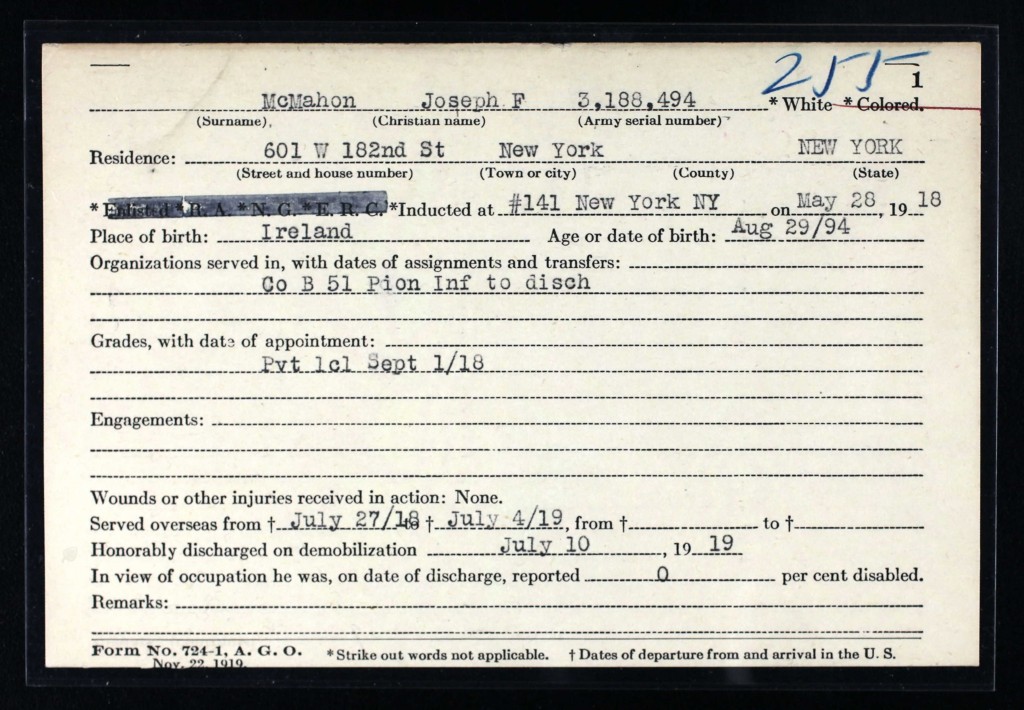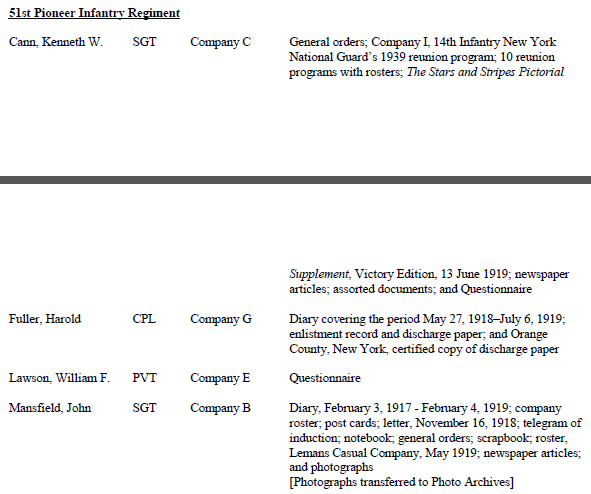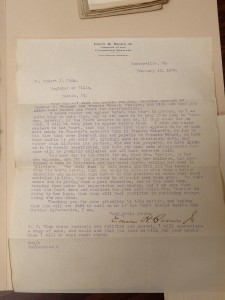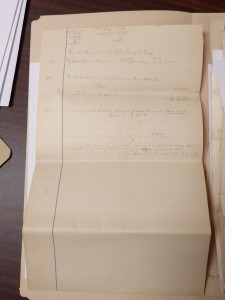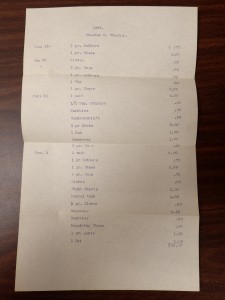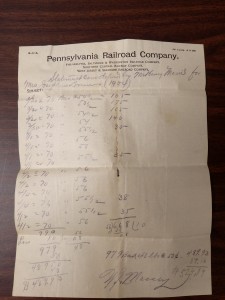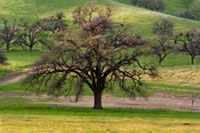Finding Joseph McMahon and the 51st Pioneer Infantry Regiment (NY), Company B
My Grandfather, Joseph F. McMahon, was born on 29 August 1894 in Kilrush, County Clare, Ireland. He arrived in the U.S. on 6 October 1907 with his widowed Mother and the youngest siblings. Sadly, he died when my Father was a young child. Through this research into his military service, I am trying to learn about him and the stories that he might have told.
As I have researched his life, I found out that many of my preconceived notions were incorrect. Most notably, he became a citizen before his military service in WWI. Also significant was that he married my Grandmother before going to war. I did not know how they met, but the 1920 U.S. Census gave the clue that they were both clerks in the Western Union Telegraph office.
One my earliest steps was contacting the National Personnel Records Center (NPRC) of NARA by mail. I received a call from their office asking me to verify some information to make sure that they had the correct Joseph McMahon. I recognized the address in Brooklyn that was given. His records were lost in the 1973 fire, so I received a final payment roll record.
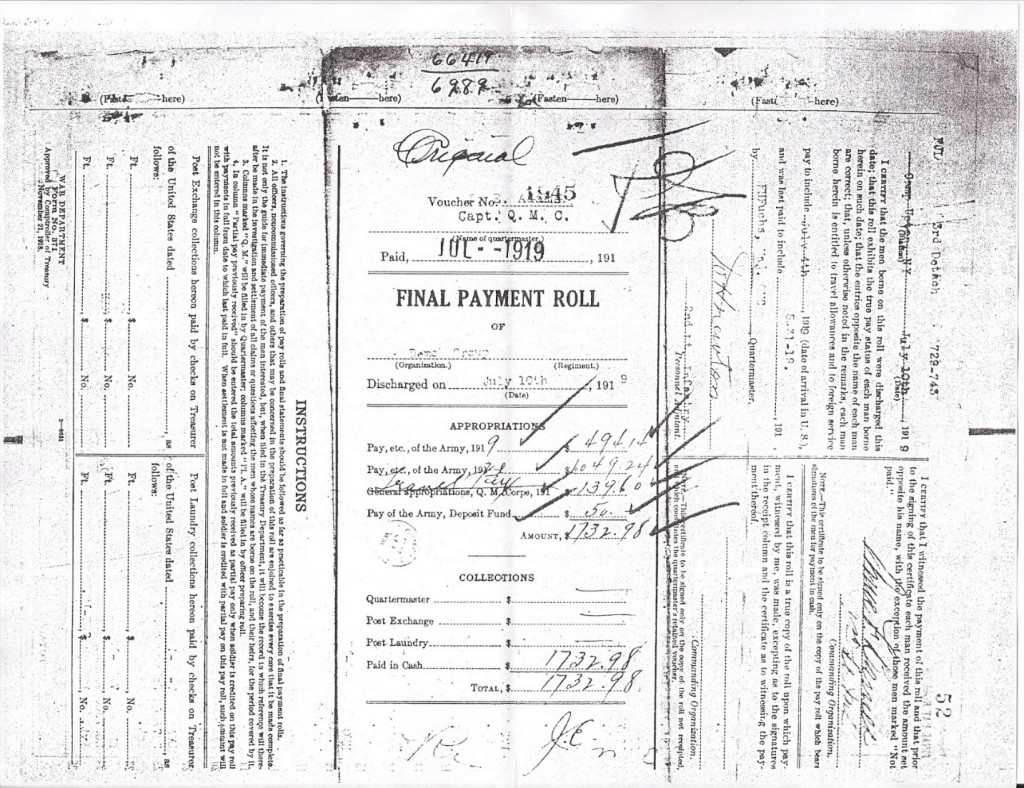
Another step in researching his service was writing to the New York State Archives for his service abstract card. This was done via mail before the database became available at Ancestry.com.
From this card I could begin to construct a timeline of his military life.
| Joseph F. McMahon – Timeline of Service | Co B 51 Pioneer Infantry |
| 28 May 1918 | Inducted @141 New York, NY |
| 27 July 1918 | Leaves for overseas |
| 1 Sep 1918 | Pvt 1cl |
| 4 July 1919 | Return from overseas |
| 10 July 1919 | Discharge (Final Payment Roll) |
My first visit to the U.S. Army Heritage & Education Center was to attend a lecture. At that point, I did not know as much about the 51st Pioneer Infantry from New York. (The person on the desk was not familiar with the term “Pioneer” so I knew I needed to have more information.) These Pioneers were New York State National Guard troops, and not part of the regular Army.
Using Google terms: 51st pioneer infantry has brought up some information
There is a website for Camp Wadsworth, Spartanburg, SC. The website includes pictures of the camp and information about the military training there. Some of the information there included:
51st Pioneer Infantry: Formerly 10th New York Infantry. Composed of 39 officers and 904 enlisted men after reorganization. Commanded by Colonel J. Guy Deming and filled to wartime strength with draftees. The regiment left Camp Wadsworth on July 17th with 3545 officers and men.
There is a New York Military History Museum, with a lot of information online.
There are “Gas Attack” Magazines from Camp Wadsworth that mention the 51st. Since the website did not have a search engine, I used Google terms: 51st pioneer site:https://dmna.ny.gov
I am working to learn more about the history the 51st Pioneer Infantry from New York in World War I. My first stop was Google and Google Books.
Combining the information I have found in my Google searches, I have compiled some timeline information. Some may overlap or be contradictory, and at this point I do not know the movements or actions specifically involving Company B of the 51st Pioneer Infantry of New York.
- The 51st was a New York National Guard Regiment, reorganized as a Pioneer Infantry.
- The 51st Pioneer Infantry was formerly the 10th New York Infantry (National Guard).
- 4 JAN 1918 The 10th NY Infantry was re-designated 51st Pioneer Regiment; 1st NY Infantry was re-designated 1st Pioneer Regiment
- The 51st Pioneer Infantry was composed of 39 officers and 904 enlisted men after reorganization. It was commanded by Colonel J. Guy Deming and filled to wartime strength with draftees.
- They were organized in Jan 1918 in Camp Wadsworth, SC as corps troops unit
- These troops were not part of any Division; they were attached when needed to an American Army or Corps.
- The regiment left Camp Wadsworth on 17 July 1918 with 3545 officers and men.
- They went overseas in Jul 1918
- 29 JUL 1918 Left Camp Wadsworth for Port of New Jersey Steamer “KROONLAND” to France
- They served with IV Army Corps Aug-Sep 1918
- 8 AUG 1918 arrive Brest, France
- Assigned to Corps Engineers, 4th Army Corps, US AEF
- The 51st (and 1st) Pioneer Infantry Regiments served as Corps Engineer support with the 4th Corps.
- They served with First Army Sep 1918
- They served with IV and VI Army Corps Sep-Nov 1918
- 12 SEP 1918 St Mihiel campaign
- They were with the Third Army on the Rhine occupation
- They returned to the U.S. in Jul 1919
- They were demobilized at Camp Upton, New York
Using the online resources at USAHEC, I searched for specific items I want to view at their facility in Carlisle, PA. I used the combined search in the “Library Catalog and Digital Collections” box on the Research Page, described in this Tutorial.
I found:
(1) Pioneer_infantry_World_War_I_veterans_survey_inventory
(2) Militia_Bureau_World_War_I_veterans_survey_inventory (the entry for the 51st Pioneer referred me back to the first document)
(3) (Newspapers) The 51st pioneers [weekly].
(4) (Photographs) Pioneer Regiments – 51st Pioneer Infantry RG522s – Moses Thisted Coll. View of the 51st Pioneer Infantry Regt. in Germany, 1919.
The Pioneer_infantry_World_War_I_veterans_survey_inventory included listings for all the Pioneer Infantries. From there I learned that the 7th through 50th Pioneer Infantry Regiments were never organized.
There was an entry for someone in Company B.
I am also finding out a little more about the 51st Pioneer Infantry using newspapers. Specifically, I have begun to use Fulton Postcards because of the number of digitized New York State newspapers at the site.
This post © 2015 Dr. Margaret McMahon. Created 7 August 2015.


